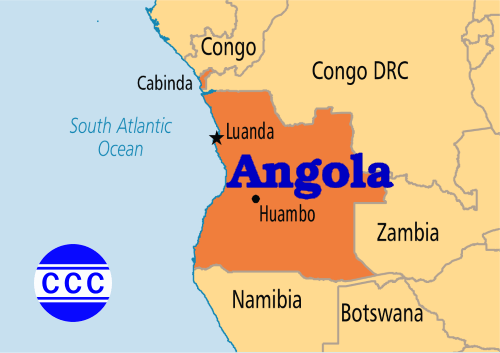Exporting to Angola
Cayley Chemicals have been exporting to Angola for quite a number of years, but Angola is considered one of the more difficult countries in the world to successfully export to. The process of importing goods into Angola is time consuming and highly bureaucratic. Unlike many other African countries that require an eCTN (see our article here), Angola relies on hard copy certificates as opposed to electronic tracking. The World Bank ranks Angola at 183 for the difficulty of import process out of 190 countries assessed for the most time consuming import procedures. Angolan import regulations are subject to periodic changes and therefore require exporters to maintain close contact with their importer/distributor to avoid potentially lengthy customs entry delays.
Importers must be registered with the Angolan Ministry of Commerce for the category of product they are importing. Only registered companies can apply for an import license which is required for imports of sensitive products such as food, medical devices, pharmaceuticals and agricultural inputs. To minimize customs problems and delays, exporters should ensure that the Angolan importer holds import registration status for the appropriate product category and has experience importing and handling international products.
Documentation required for import into Angola includes:
- Original Air Way Bill (AWB) / Bill of Lading (BL)
- Original Commercial Invoice (listing HTS codes for each item)
- Packing List
- Angolan Loading Certificate issued in country of shipment
- Import License and/or phytosanitary certificate issued by the relevant Ministry, if required based on product
Angolan Loading Certificate
Angolan law states that all cargo purchased abroad for importation into Angola requires a loading certificate (also known as Waiver / ARC / CNCA Certificate) issued by a National Council of Angolan Shippers (CNCA) authorised agent in the country of origin. A list of approved agents is available on the CNC Agents website or you can see a PDF version we have prepared here. The application form (designed in Microsoft Excel) for the Loading Certificate is available at the CNC Tariffs website (scroll to the bottom of the page to download the 64k form in English or Portuguese) or you can download an English Excel version of the form from our website here or a PDF version here. The loading certificate must be obtained by a CNCA agent before loading the cargo. Here is an example of the issued Certificate.
The loading certificate number (waiver number) much be shown on all documentation related to the cargo shipped under that loading certificate. It is the shipper and/or forwarder’s responsibility to provide the loading certificate number to the ocean carrier at the loading port for inclusion in the manifest and bill of lading.
CNCA Angola Rules
Bills of Lading require an authorised loading certificate. Cargoes without a corresponding certificate will not clear customs in Angola and will be issued additional CNCA fines. Loading certificates contain specific serial numbers and the document must be signed, dated and stamped by the authorised CNCA agent.
Shippers or forwarders must pay Loading Certificate Fees and Harbour Data Processing Fees outlined below:
- 20ft Container Fee: US$100 per container
- 40ft Container Fee: US$200 per container
- Bulk / Conventional Cargo Fee: US$5 per weight measure
- Loading Certificate Fee: US$60 per Bill of Lading
Prices correct at Sept 2017. Please check prices if you are viewing this later.
If above fees are not paid when cargo is loaded, CNCA fees will be doubled and an additional fine of up to USD 5,000 can be issued per incident.
Bill of Lading
In April 2015, the Angolan Customs Agency (AGT) issued implementing guidance #003258/DNPA/DSA/AGT/2015 related to the February 15, 2015 AGT Advisory that allows for merchandise procured through a Letter of Credit to be released from the port with presentation of a copy of the Bill of Lading, rather than the original. This move was established to address complaints from importers accruing significant port storage fees awaiting foreign exchange from the Angolan Central Bank as required to secure an original bill of lading. Under this regulation, importers are required to submit the original bill of lading within 30 days to maintain their importing authorisation. In practice, few Angolan banks are issuing Letters of Credit due to the unreliability of access to foreign exchange required to deliver on these payments so exporters are advised to ship to Angola on non-Letter of Credit terms due the extended delays of several months being experienced by Angolan importers in securing foreign exchange for imports.
Pre-shipment inspection
According to Presidential Decree No. 63/13 of June 11, 2013, pre-shipment inspections are no longer mandatory. However, exporters may hire pre-shipment inspection services from private inspection agencies if they wish to benefit from fast track “green channel” access upon cargo arrival at Angolan Customs.
Laboratory Testing
Imports of foods and pharmaceutical products are subject to testing during customs clearance. Angolan Presidential Decree No. 140/16 of July 7, 2016 sets forth new regulations for the laboratory analysis of imported products and for nationally produced products to better control the quality and safety of products for human consumption. Private and public laboratories manage this inspection process at the port of entry. This new regulation specifies fees for laboratory testing by type of product as well as methodologies and type of tests to be administered. Once in the Angolan market, these products face additional oversight during retail distribution by the Ministries of Commerce, Agriculture and Health.


